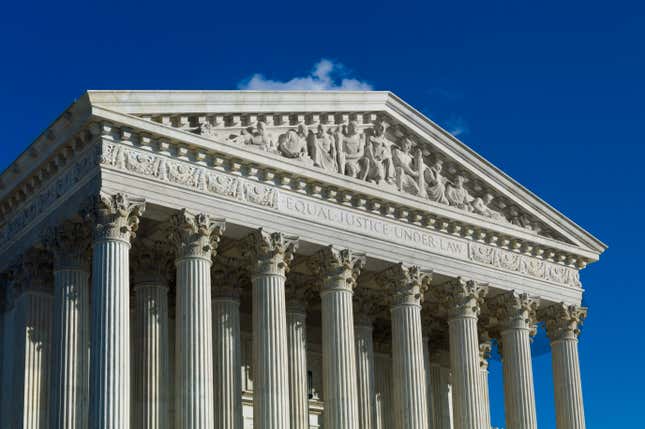The Supreme Court Effectively Overturned Your Miranda Rights
In Vega v. Tekoh, the court decided individuals don't have the right to sue police officers just for failing to read their Miranda rights.
JusticePolitics

The Supreme Court on Thursday ruled that individuals do not have the right to sue police officers solely on the basis of failing to read them their Miranda rights. By a 6-3 margin, the court has shielded police from legal action, with dissenting liberal justices warning that this decision could allow officers to use coercive tactics against people they take into custody with impunity.
Vega v. Tekoh asked whether a person can sue a police officer for violating their Fifth Amendment right against self-incrimination by interrogating them without first issuing a Miranda warning. In 1966, the court ruled that an arrested individual has the right against self-incrimination and to legal representation—Miranda v. Arizona is the reason police have been required to tell arrested individuals they have “the right to remain silent.” Now, given the conservative Supreme Court’s mounting track record of limiting the rights of defendants in the criminal justice system, it feels inevitable that the court will eventually overturn the entire ruling.
In 2014, a woman told Carlos Vega, a Los Angeles County sheriff’s deputy, that Terence Tekoh, a patient transporter, had sexually assaulted her en route to the hospital. Vega then interrogated Tekoh at the hospital without reading him his Miranda rights, and received Tekoh’s signed confession. A jury acquitted Tekoh due to the violation of his Miranda rights, and Tekoh went on to sue Vega, leading to two civil trials in which the jury sided with Vega. When Tekoh appealed, the Ninth Circuit reversed these juries’ decisions.
Thursday’s decision will make it even harder to hold police officers accountable. “One of the most direct outcomes of Vega would be that a potential cause of action against police officers would be foreclosed,” Jorge Xavier Camacho, the law and policy director of the Justice Collaboratory at Yale University, told Jezebel. “If the court rules you can’t sue an officer for failing to read your Miranda rights, that closes off a potential avenue to seek recourse.”
In a statement released ahead of the decision, David Shapiro, a professor of law at Northwestern, said that if the court held that a police officer’s failure to read Miranda rights is “not grounds for a civil suit”—which it did—this will be “another step backwards in people’s ability to hold law enforcement officers accountable for misconduct in federal court.”
Camacho warned that, following the Supreme Court’s ruling, we will “increasingly see this issue falling to state and local legislators,” creating a patchwork of individual rights across the country. “Many local and state governments have been very hesitant” to bolster the rights of people arrested and incarcerated within their jurisdictions, but he hopes Thursday’s decision will prompt future action.